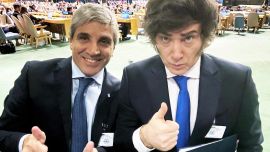With Latin America now the “epicentre” of the Covid-19 pandemic, Argentina is attracting global attention as its sovereign debt showdown with private creditors enters its most critical stage. The nation has defaulted for a ninth time after purposely missing debt servicing payments yesterday, but what appeared as a final deadline has once again given way to a mutually accepted extension. With talks underway, both sides have publicly accused each other of acting in bad faith, but have also recognised they prefer an agreement over a messy and acrimonious divorce. Argentina’s debt restructuring negotiation has global implications in that it will serve as a sort of foreshadowing of what is to come given the immensity of the worldwide recession the coronavirus pandemic will leave behind. Whatever blueprint Argentina and its creditors leave for the rest of the world’s increasingly troubled debtors, the nation will have to face “the day after” sooner or later, where some 89 percent of the population has directly or indirectly received a public subsidy during this crisis, while the state is absolutely broke.
President Alberto Fernández’s bold bet on a young and inexperienced economy minister is close to revealing its worth. Martín Guzmán has led a meticulous and relatively civilised battle with Wall Street titans who have shown a predisposition to reaching a solution that works for everybody. Despite publicly shaming BlackRock CEO Larry Fink, both as the Ministry leaked an initial offer of theirs that was “not even in our same planet” and after the Guzmán’s former Columbia University colleague Jeff Sachs signalled him out in a widely shared op-ed, it seems clear that the world’s largest asset manager is ready to play ball. Leading the Ad Hoc Bondholders Group, which holds more than 25 percent of the post-2016 bonds and 15 percent of the 2010 “Exchange bonds,” BlackRock has suggested to its fellow “masters of the universe” that it is willing to negotiate lower returns in order to settle on a deal.
In a statement released this week, they noted, “by providing the administration with an extended period of significant cash flow relief, the group seeks to provide a window for the steadfast implementation of policies which support economic growth, financial sector inclusion and overall sustainable development.” Yet, and because this is a negotiation, they added: “Regrettably, despite the efforts of the group and other stakeholders, the proposals contained in the recently published press release are not ones which the group can or will support.” Reading between the lines it emerges that not only are these funds interested in reaching an agreement rather than litigating, but they are actively and constructively negotiating with Guzmán and his team.
The same thing can be said of Guzmán. While his countenance indicates introversion, dogmatism and resilience, he has walked hand-in-hand with the creditor group every step of the way, within the bounds of what he calls “debt sustainability.” While he has publicly said that Argentina’s offer is final and the risks of default aren’t any worse than what the sovereign is currently experiencing, he has already pushed back the deadline for negotiations two times (this last one triggering an actual default) and acknowledged the very real possibility of improving the deal. Reports suggest a counter-offer by the Ministry is expected within days or weeks, meaning he is trying to close the deal before the new June 2 deadline. This doesn’t mean we shouldn’t expect another extension, but that once again the self-imposed short deadlines are an indication of a certain haste to resolve the matter. It also doesn’t guarantee that an agreement will be reached, but it tilts the scales that way. Failing to reach a deal would signal the failure of Guzmán’s raison d'être.
With Argentina formally in default, even if it is selective for the time being, the ticking clock has just been sped up with regards to the actual damage being caused by the situation. As both President Fernández and Guzmán have said, this situation – virtual default – was something they received from the previous administration and the work of former economy minister Hernán Lacunza and his “re-profiling” of peso-denominated debt, as well as his predecessor Nicolás Dujovne and ex central banker Luis “Toto” Caputo. Every day that passes without a resolution is a day of increased uncertainty both in sovereign debt markets and in the private sector, which is suffering from the double whammy of Argentina’s chronic economic decrepitude and the global crisis sparked from the coronavirus but also exacerbated by economic disruptions that preceded the pandemic.
It is also another day of emergency measures, and therefore financing, which at this point is essentially all money printing. It is not to say that once the veil of uncertainty regarding the debt situation is lifted Argentina will be able to access voluntary debt markets like some of its neighbours, as any deal reached with creditors would still be nothing more than ink on paper in the context of the ongoing Covid-19 outbreak. Yet, it would temporarily clear the risk of a hard default, and the subsequent shock to the market and popular confidence that would undoubtedly lead to increased animosity with sectors of the opposition. It is also time-consuming for the teams that should be planning Argentina’s response to the economic catastrophe that is being left behind by a massive public health crisis, particularly as the country’s major urban centres remain under lockdown.
It has become cliché to say that every crisis is also an opportunity, but the “state of exception” we are living through could give Guzmán and Fernández the support, and the space, to actually pursue structural reforms that would be impossible in other moments. Businessmen, union leaders, opposition politicians and the general population have been united by the common enemy that is the Covid-19 virus, and are now looking to the government for leadership and mission. Reforming the country could be one such objective. All of that is contingent on continued unity, which is something we should be very sceptical of, both because of those governing the country and those in the opposition. One step at a time.





















Comments